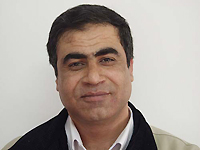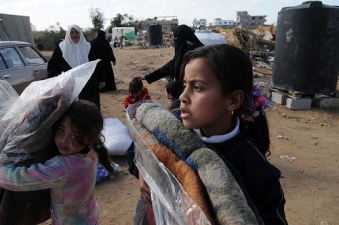
[ 2009.1.29 ]

Jawad Harb (C)CARE | Jawad Harb is a Palestinian living in Rafah, Gaza, with his wife and six children. Harb has worked with CARE since 2002, managing a program supporting women's centres in Gaza. Since the conflict began Dec. 27, Harb's program has stopped operating because of the constant bombing. |

Children in Zaytoun collect blankets from CARE after the area was
flattened in the operation.
These children have not yet returned to school because their school
was damaged and has not reopened.
There are dead livestock and un-recovered bodies around the
homes that have been reduced to rubble where survivors are currently living.
(C)CARE
He used to be so excited about going to school, but when I told him he would stay home from now on, he didn't say anything. Some of his friends have gone back to the tent school, but their parents are starting to think twice, too.
There are no temporary spaces for schools, but they will not allow construction material into Gaza. So many houses and schools are destroyed. The houses that remain standing are holding several families. It is a mess in Gaza, until we can start to rebuild. But how can we rebuild, without cement, or glass, or wood?
I can't tell you how agonizing these stories are that the kids are talking about. They keep talking about it - the war, what they saw on TV, their friends who died. They imagine how they died. Counsellors at the schools are doing activities for the children to talk to their sadness out. I hope these things work. It's a big trauma for the children. They are so young.
My daughters, who are older, don't open up to me. Maybe they talk to their mother. All my life I thought girls like to talk, but now I realize that sometimes it is hard to get girls to talk. They look so sad, but they only answer yes or no to my questions. They are still shocked. They smile less than usual.
One of my daughters is trying to write poems. She is talking about her experience in Gaza during the war, and how we Palestinians felt abandoned by the world. She wrote, "We were crying out for peace, we were crying out for help, but no one listened to us." She is 15 years old.
I am working again. It used to take me 30 minutes to get to work; now it takes one hour. The asphalt is destroyed. We drive slowly. There are holes everywhere.
At first, I was still shocked, especially seeing Gaza City for the first time, and the level of destruction - the houses, the schools, the buildings. At first, I couldn't work. I was sitting with my colleagues, asking about people, trying to find out who had died, because we couldn't find out during the war. The one thing we all missed during the conflict was sleeping at night. At least now we are able to sleep peacefully again, and we all hope this will continue.
But there are many things ahead of us. CARE will continue to distribute food, and emergency supplies, and medicine. Gaza will need to rebuild. And children, like my children, will need help recovering from this trauma.